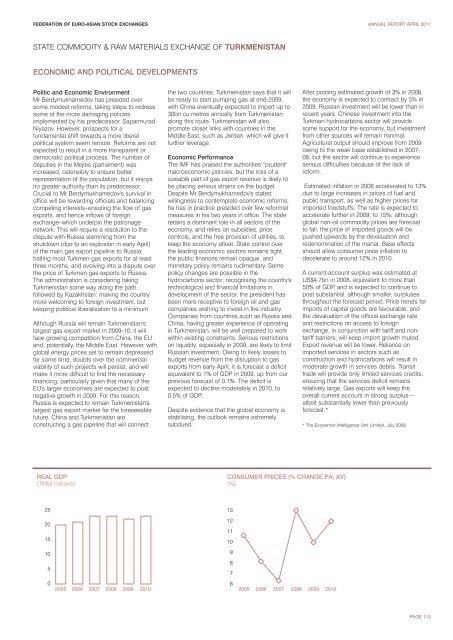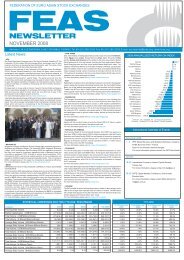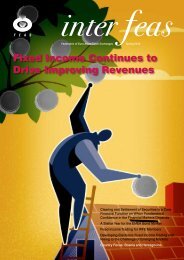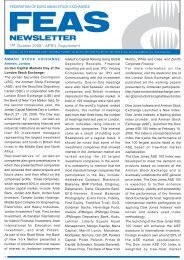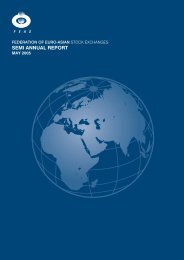Download - FEAS
Download - FEAS
Download - FEAS
Create successful ePaper yourself
Turn your PDF publications into a flip-book with our unique Google optimized e-Paper software.
FEDERATION OF EURO-ASIAN STOCK EXCHANGES ANNUAL REPORT APRIL 2011<br />
STATE COMMODITY & RAW MATERIALS EXCHANGE OF TURKMENISTAN<br />
ECONOMIC AND POLITICAL DEVELOPMENTS<br />
Politic and Economic Environment<br />
Mr Berdymukhamedov has presided over<br />
some modest reforms, taking steps to redress<br />
some of the more damaging policies<br />
implemented by his predecessor, Saparmurad<br />
Niyazov. However, prospects for a<br />
fundamental shift towards a more liberal<br />
political system seem remote. Reforms are not<br />
expected to result in a more transparent or<br />
democratic political process. The number of<br />
deputies in the Mejles (parliament) was<br />
increased, ostensibly to ensure better<br />
representation of the population, but it enjoys<br />
no greater authority than its predecessor.<br />
Crucial to Mr Berdymukhamedov's survival in<br />
office will be rewarding officials and balancing<br />
competing interests–ensuring the flow of gas<br />
exports, and hence inflows of foreign<br />
exchange–which underpin the patronage<br />
network. This will require a resolution to the<br />
dispute with Russia stemming from the<br />
shutdown (due to an explosion in early April)<br />
of the main gas export pipeline to Russia,<br />
halting most Turkmen gas exports for at least<br />
three months, and evolving into a dispute over<br />
the price of Turkmen gas exports to Russia.<br />
The administration is considering taking<br />
Turkmenistan some way along the path<br />
followed by Kazakhstan: making the country<br />
more welcoming to foreign investment, but<br />
keeping political liberalisation to a minimum.<br />
Although Russia will remain Turkmenistan's<br />
largest gas export market in 2009-10, it will<br />
face growing competition from China, the EU<br />
and, potentially, the Middle East. However, with<br />
global energy prices set to remain depressed<br />
for some time, doubts over the commercial<br />
viability of such projects will persist, and will<br />
make it more difficult to find the necessary<br />
financing, particularly given that many of the<br />
EU's larger economies are expected to post<br />
negative growth in 2009. For this reason,<br />
Russia is expected to remain Turkmenistan's<br />
largest gas export market for the foreseeable<br />
future. China and Turkmenistan are<br />
constructing a gas pipeline that will connect<br />
the two countries. Turkmenistan says that it will<br />
be ready to start pumping gas at end-2009,<br />
with China eventually expected to import up to<br />
30bn cu metres annually from Turkmenistan<br />
along this route. Turkmenistan will also<br />
promote closer links with countries in the<br />
Middle East, such as Jordan, which will give it<br />
further leverage.<br />
Economic Performance<br />
The IMF has praised the authorities' "prudent"<br />
macroeconomic policies, but the loss of a<br />
sizeable part of gas export revenue is likely to<br />
be placing serious strains on the budget.<br />
Despite Mr Berdymukhamedov's stated<br />
willingness to contemplate economic reforms,<br />
he has in practice presided over few reformist<br />
measures in his two years in office. The state<br />
retains a dominant role in all sectors of the<br />
economy, and relies on subsidies, price<br />
controls, and the free provision of utilities, to<br />
keep the economy afloat. State control over<br />
the leading economic sectors remains tight,<br />
the public finances remain opaque, and<br />
monetary policy remains rudimentary. Some<br />
policy changes are possible in the<br />
hydrocarbons sector; recognising the country's<br />
technological and financial limitations in<br />
development of the sector, the president has<br />
been more receptive to foreign oil and gas<br />
companies wishing to invest in the industry.<br />
Companies from countries such as Russia and<br />
China, having greater experience of operating<br />
in Turkmenistan, will be well prepared to work<br />
within existing constraints. Serious restrictions<br />
on liquidity, especially in 2009, are likely to limit<br />
Russian investment. Owing to likely losses to<br />
budget revenue from the disruption to gas<br />
exports from early April, it is forecast a deficit<br />
equivalent to 1% of GDP in 2009, up from our<br />
previous forecast of 0.1%. The deficit is<br />
expected to decline moderately in 2010, to<br />
0.5% of GDP.<br />
Despite evidence that the global economy is<br />
stabilising, the outlook remains extremely<br />
subdued.<br />
After posting estimated growth of 3% in 2008,<br />
the economy is expected to contract by 5% in<br />
2009. Russian investment will be lower than in<br />
recent years. Chinese investment into the<br />
Turkmen hydrocarbons sector will provide<br />
some support for the economy, but investment<br />
from other sources will remain minimal.<br />
Agricultural output should improve from 2009<br />
owing to the weak base established in 2007-<br />
08, but the sector will continue to experience<br />
serious difficulties because of the lack of<br />
reform.<br />
Estimated inflation in 2008 accelerated to 13%<br />
due to large increases in prices of fuel and<br />
public transport, as well as higher prices for<br />
imported foodstuffs. The rate is expected to<br />
accelerate further in 2009, to 15%; although<br />
global non-oil commodity prices are forecast<br />
to fall, the price of imported goods will be<br />
pushed upwards by the devaluation and<br />
redenomination of the manat. Base effects<br />
should allow consumer price inflation to<br />
decelerate to around 12% in 2010.<br />
A current-account surplus was estimated at<br />
US$4.7bn in 2008, equivalent to more than<br />
50% of GDP, and is expected to continue to<br />
post substantial, although smaller, surpluses<br />
throughout the forecast period. Price trends for<br />
imports of capital goods are favourable, and<br />
the devaluation of the official exchange rate<br />
and restrictions on access to foreign<br />
exchange, in conjunction with tariff and nontariff<br />
barriers, will keep import growth muted.<br />
Export revenue will be lower. Reliance on<br />
imported services in sectors such as<br />
construction and hydrocarbons will result in<br />
moderate growth in services debits. Transit<br />
trade will provide only limited services credits,<br />
ensuring that the services deficit remains<br />
relatively large. Gas exports will keep the<br />
overall current account in strong surplus—<br />
albeit substantially lower than previously<br />
forecast.*<br />
* The Economist Intelligence Unit Limited, July 2009<br />
REAL GDP<br />
(TMM millions)<br />
CONSUMER PRICES (% CHANGE PA; AV)<br />
(%)<br />
25<br />
20<br />
15<br />
10<br />
5<br />
0<br />
6<br />
2005 2006 2007 2008 2009 2010 2005 2006 2007 2008 2009 2010<br />
13<br />
12<br />
11<br />
10<br />
9<br />
8<br />
7<br />
PAGE 113


